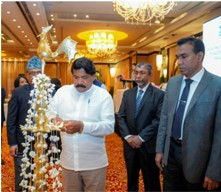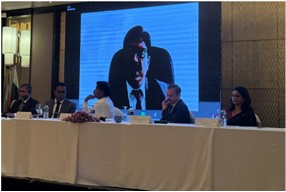7 August 2025, Colombo, Sri Lanka
The SAARC Development Fund (SDF), in collaboration with national institutions and technical agencies from five SAARC Member States, officially launched the AquaLivelihood Project in Colombo, Sri Lanka, aimed at strengthening smallholder fish farming and improving nutrition security across the region.
The launch, graced by Sri Lanka’s Minister of Fisheries Ramalingam Chandrasekar as Chief Guest, marked a major regional effort to empower rural communities through sustainable aquaculture. The three-year initiative entails a total investment of USD 3.97 million, including a USD 3.23 million grant from SDF and USD 739,109 in in-kind co-financing, directly benefiting over 120,000 rural households 30% of them women in Bangladesh, Bhutan, India, Nepal, and Sri Lanka.

Minister Chandrasekar described AquaLivelihood as “a transformative journey toward a resilient future for small-scale farmers’.
Titled “Livelihood Enhancement of Small-Scale Fish Farmers and Nutrition Security of Rural Masses in the SAARC Region through Aquaculture Development”, the project is led by the ICAR–Central Institute of Freshwater Aquaculture, Bhubaneswar in partnership with the Department of Fisheries, Bangladesh; National Research and Development Centre for Aquaculture, Bhutan; Central Fisheries Promotion and Conservation Centre, Nepal; and the National Aquaculture Development Authority, Sri Lanka.
The project addresses two key regional priorities: enhancing livelihoods of small-scale aquaculture farmers and tackling malnutrition through sustainable fish production systems. It will be implemented through three strategic components:
1. Survey & Technology Identification – Mapping inputs, feed, seed, and promoting inclusive practices.
2. Infrastructure Development – Establishing pilot-scale feed mills and fish hatcheries to strengthen local production.
3. Capacity Building & Knowledge Sharing – Delivering cross-border training, on-farm demonstrations, and promoting gender equity and regional knowledge exchange.
Highlighting India’s leadership role, Dr. Joykrushna Jena, Deputy Director General (Fisheries Science), ICAR, said the project embodies a shared commitment to regional cooperation, policy alignment, and inclusive growth in the fisheries sector.
Dr. J. M. Asoka, Director General, NAQDA, Sri Lanka, called it a timely intervention to expand income opportunities and support national and regional nutrition goals.

Fish remains a major protein source in South Asia, accounting for over 60% of animal protein intake in countries like Bangladesh, Sri Lanka, and Nepal. Aquaculture growth in the region has been notable 11% in Nepal, 5.4% in Bangladesh, and 6–8% in India over the past decade making it a vital driver of agricultural GDP and rural livelihoods.
Following the launch, a two-day inception workshop was held with partners from all five participating countries to align strategies and ensure coordinated implementation across the region.
(Source: ICAR-Central Institute of Freshwater Aquaculture, Kausalyaganga, Bhubaneswar)








Like on Facebook
Subscribe on Youtube
Follow on X X
Like on instagram